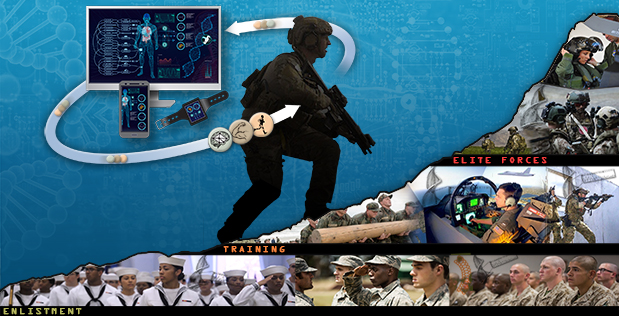“Un individuo puede tener genes que parecen predecir el éxito en un rol, pero no manifiestan los rasgos o comportamientos esperados. La investigación del Programa de Medición Biológica ( MBA) de DARPA está diseñada para descubrir mecanismos biológicos adicionales que influyen en la expresión fenotípica y desarrollar herramientas para medir esos cambios, de modo que sea posible impactar con mayor precisión el rendimiento y la resistencia en una variedad de escenarios.”
DARPA’s Measuring Biological Aptitude (MBA) program begins and ends with the men and women of the United States military. The program — first announced in January 2019 — centers on how service members can access the potential of their own biological systems to achieve peak results across a range of military specializations, and aims for a detailed understanding of how measurement of those systems in real time can help service members perform at their maximum potential. If it succeeds, MBA technologies will provide insights into how the Department of Defense can enhance and sustain readiness by improving training, boost mission effectiveness, speed recovery following missions, and mitigate shortages of qualified candidates for highly specialized roles.
“DARPA created the MBA program to help service members understand and achieve their innate biological potential as it relates to performance and resilience,” said program manager Eric Van Gieson. “We plan to deliver knowledge and tools that improve the outcomes of training scenarios, support the formation of stronger mission teams, and ensure that operations unfold with the best chances of success all the way through post-mission recovery. We’ll do this by providing service members with an ability to measure and make sense of the molecular systems that drive how the body and mind function, and then help them use that information to improve throughout their careers.”
The crux of MBA is correlating the externally observable physical, behavioral, and cognitive features and traits of highly successful specialized operators — their phenotypes — with measurable elements of their biology to understand and ultimately anticipate how they might perform in various situations over time; this information can then be used to improve training and development at an individual level. DARPA selected three teams to deliver on that vision: GE Research (GE), Lawrence Livermore National Laboratory, and the Institute for Human Machine Cognition (IHMC).
Because an individual’s genetic code — or genotype — does not translate directly into phenotypes, DARPA requires MBA researchers to do far more than decode the genome. The MBA teams led by GE, under principal investigator Dr. Azar Alizadeh, and IHMC, under principal investigator Dr. Tim Broderick, are working backwards from observed measurements of military training among high performing troops to characterize relevant phenotypes across a range of specializations. After identifying phenotypes, they will work to elucidate the current black boxes of human biology known as gene expression circuits, which are the molecular mechanisms by which genotype translates into phenotypes; expression circuits are made up of epigenetic, transcriptomic, proteomic, metabolomic, and other systems that have major impacts on performance and resilience. The teams will also attempt to identify one or more measurable biomarker for each circuit, determine the rates at which those biomarkers change, and build novel sensors to measure changes in real time.
“An individual may have genes that would seem to predict success in a role, yet not manifest the traits or behaviors expected. MBA research is designed to uncover additional biological mechanisms that influence phenotypic expression and build tools to measure those changes so that it becomes possible to more accurately impact performance and resilience under a range of scenarios,” said Van Gieson.
Much of the upfront work on MBA entails collecting and anonymizing data for phenotypic analysis. GE and IHMC will gather physical, biological, and cognitive performance data from active military cohorts during a mix of training events and routine scenarios. The data include audio and video recordings; biological samples; readouts from wearable health and fitness sensors that measure physical activity, sleep, heart rate, and physiological load; and results of standardized cognitive and behavioral assessments that measure factors related to fluid intelligence, executive function, memory, learning, attention, and processing speed. GE and IHMC will also provide medical guidance as part of any human study through an embedded genetic counselor, sports therapist, or similar specialist to help individuals make sense of results.
Elucidating the gene expression circuits that drive a given phenotype requires a new class of analytical techniques that can handle billions of variables. Ultimately, analytics must reveal when and how key measurements of biomarkers should be made to guide the teams in their development of sensors suitable for long-term use. GE is initially developing a microneedle system worn across the body; IHMC is developing a dental overlay. Both teams will reassess their sensing approaches as the program progresses based on refined understanding of what biomarkers are significant.
Lawrence Livermore National Laboratory will conduct independent validation and verification (IV&V) of the other teams’ results, hardware, and processes to confirm they are operationally relevant. The IV&V work includes testing the functional lifetime of MBA sensors and evaluating their user interfaces to understand potential failure modes and opportunities for misinterpretation of results.
“One of DARPA’s goals for MBA is to take the technology we develop and place it immediately into the hands of military operators and cadres when the program ends,” Van Gieson said. “Our systems need to be functional and validated from Day One so that even a novice operator can use them appropriately and trust the data they provide.”
In the final phase of the MBA program, GE and IHMC will demonstrate their systems in trials with military service members. DARPA requires that the systems outperform the traditional selection processes carried out by military cadres.
The MBA program benefits from consultations with independent advisors in the ethical, legal, social, and regulatory aspects of the work, with particular emphases on privacy, data protection, and responsible utilization of data by anyone with access.
Fuente: https://www.darpa.mil


